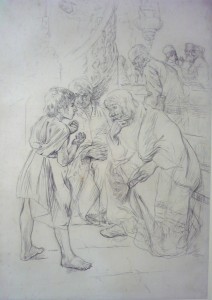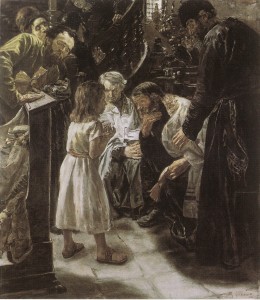 How Jewish thinkers started to bring the Nazarene home to Judaism
How Jewish thinkers started to bring the Nazarene home to Judaism
When Reza Aslan published an academic study on the life of Jesus last year, he pursued his passionate interest by focusing on Jesus as a historical figure. In his book entitled Zealot, Aslan paints a picture of Jesus as a zealous revolutionary surrounded by ignorant inhabitants of the poor region of Galilee. He is portrayed as a man whose aim was not so much about preaching about the heavenly kingdom but more about liberating Palestine from the occupying Roman power. Did Jesus understand the concept of a God who became human? According to Aslan: no. Aslan’s Jesus is fully and completely a Jew, animated by the messianic thought that King David’s Israel must be resurrected as a state under God’s authority. Reader’s reactions were extremely divided. It turns out though that criticisms were less about the content and more about the fact that Aslan is Muslim. Aslan’s book belongs to a genre that goes back to the eighteenth century and the works of the German philosopher Hermann Samuel Reimarus.
Observing the law of Moses
Since then, until the 1990s, research on the life of Jesus has experienced three major waves. Aslan is probably the first Muslim author in this field, although he has always insisted that he writes from the perspective of the impartial scholar. The question whether he as a Muslim, has the right to do so is not new either. Similar questions have been asked over the past two centuries as Jewish scholars became increasingly interested in the topic.
The philosopher Moses Mendelssohn (1729–1786), the pioneer of Jewish Enlightenment, wrote that, “Jesus of Nazareth himself observed not only the law of Moses but also the ordinances of the rabbis; and whatever seems to contradict this in the speeches and acts ascribed to him appears to do so only at first glance. Closely examined, everything is in complete agreement not only with Scripture, but also with the tradition.” In the wake of the Enlightenment and Jewish emancipation, the apologetic and polemical position of the Middle Ages could be overcome in favor of a constructive discussion. The French physician Joseph Salvador (1796–1873) in 1838 presented the first Jewish Jesus monograph. As part of the emerging field of Jewish studies, Isaak Markus Jost (1793–1860) opened with his appreciative classification of Jesus as a Volkslehrer (a teacher of the people) a path that was taken in the nineteenth and twentieth centuries primarily by liberal Jewish thinkers. It is the story of a “repatriation of Jesus” to Judaism that could be observed since the nineteenth century.
By contrast, Christian theology devalued the quest of the historical Jesus by turning away from theological liberalism. The beginning of scholarly Jewish research into Jesus, which started at the same time, continued the liberal tradition. In so doing, it emphasized aspects to which insufficient justice was done in Christian research, namely the Jewish character of the life and teaching of Jesus – a process which is part of “bringing Jesus home to Judaism”. Because the conflict with the Jewish Law was no longer located at the centre of Jesus’ life, other possibilities of historically interpreting Jesus’ violent death were considered. Thus, Jesus was depicted in the classical accounts of the Jewish quest as an exemplary Jew, ethicist, exhorting prophet, revolutionary, rebel, freedom fighter, big brother and finally as a messianic Zionist.
The impetus for this Jewish quest was most probably given by Julius Wellhausen (1844–1918) through historical-critical biblical scholarship. Wellhausen formulated the sentence, the consequences of which determined the work of Christians and Jews ever since: Jesus was not a Christian, he was a Jew! The work of Abraham Geiger (1810–1874) on the Jewish Jesus and on Christianity is the preliminary design of a counter-history. Polemical in tone, he shows Jews of the nineteenth century why they should continue to remain faithful to Judaism rather than seeking to discover in Christianity a higher stage of religious development that Judaism had, allegedly, never reached. Thus Geiger stands at the beginning of a Jewish quest of the historical Jesus that demands a reasonable assessment in the history of religion of the Jewish sources. Especially in the central domain of Christian theology, the interpretation of the figure of Jesus, Jews should be perceived as authoritative partners in the study of early Judaism.
On the Christian side, the contributions of Jewish Jesus research were perceived not as a beneficial questioning of prejudices, or perhaps as an offer of dialogue, but as arrogance. In his 1863 book Das Judenthum und seine Geschichte (Judaism and It’s History) Abraham Geiger draws a portrait of Jesus as one of the most influential Pharisees of his time. According to Geiger, the recorded words and deeds of Jesus represent nothing unique and original. Rather, the sum total of Jesus’s teachings can be discovered in the Pharisaic literature. The early Christians, on the other hand, departed from his faith and doctrine due to Sadducean and pagan influences and absorbing elements from the Greco-Roman world. Geiger’s blueprint of Jesus as a Pharisee and Christianity as a betrayal of Jesus’ Jewish faith became a popular explanatory model of Christian origins for modern Judaism. While at the same time providing a defensive position against the Christian assumption that Judaism constituted only a fossilized step towards Christianity. In their effect, Judaism and Christianity entail one another, according to Geiger: there is no Christianity without Judaism, and the significance of Judaism for Western civilization ultimately depends on the success of its “daughter religions,” Christianity and Islam.
What image of Jesus can now be obtained from the Jewish point of view? Jesus was a great man for his time, but he was not a perfect human being, and even as a great man, he assumes no special status because Judaism has produced many great men. Jesus deserves no supernatural dignity, but as a phenomenon and an integral part of Western civilization, he cannot be overlooked, even by Jews. To quote a pupil of Rabbi Leo Baeck, Ernst Ludwig Ehrlich (1921–2007), “Judaism has never acknowledged a single teacher, only the chain of teachers, the stream of tradition. It has always resisted placing one person at the center”. If it is true that God is the Lord of history, then the historical impact of Christianity must be recognized as a religion closely linked with Judaism. From the Jewish perspective, was Jesus a Pharisee and scribe? Maybe. Was he significant? Without a doubt. Was he the Messiah or even the Son of God? According to Jewish understanding: no.
Rabbi Walter Homolka is rector of the Abraham Geiger College at Potsdam University

